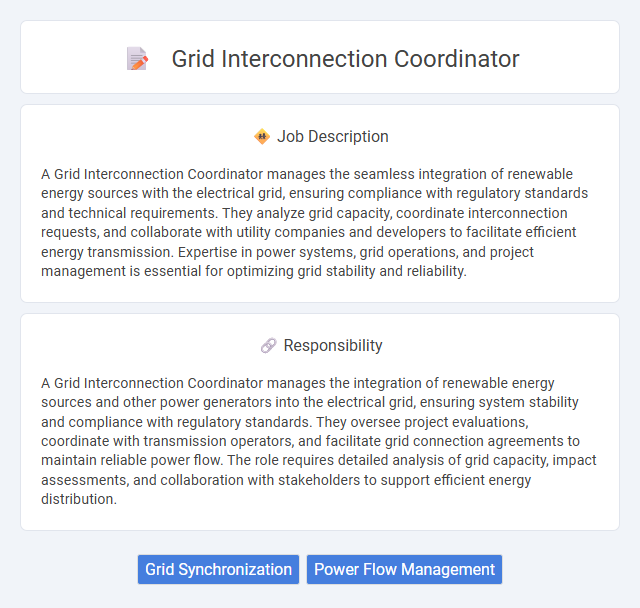
A Grid Interconnection Coordinator manages the seamless integration of renewable energy sources with the electrical grid, ensuring compliance with regulatory standards and technical requirements. They analyze grid capacity, coordinate interconnection requests, and collaborate with utility companies and developers to facilitate efficient energy transmission. Expertise in power systems, grid operations, and project management is essential for optimizing grid stability and reliability.
Individuals with strong analytical skills and a detail-oriented mindset are likely to thrive as Grid Interconnection Coordinators, given the technical and regulatory complexities involved. Those comfortable with managing multiple stakeholder communications and adapting to dynamic industry standards may find this role suitable. People who prefer structured problem-solving environments and can handle high responsibility under pressure probably fit well in this position.
Qualification
A Grid Interconnection Coordinator requires a strong background in electrical engineering or power systems, typically holding a bachelor's degree with relevant certifications such as NERC or IEEE standards. Expertise in grid interconnection procedures, compliance regulations, and project management is essential to ensure seamless integration of distributed energy resources. Proficiency with SCADA systems, grid modeling software, and regulatory frameworks enhances the ability to coordinate complex interconnection requests efficiently.
Responsibility
A Grid Interconnection Coordinator manages the integration of renewable energy sources and other power generators into the electrical grid, ensuring system stability and compliance with regulatory standards. They oversee project evaluations, coordinate with transmission operators, and facilitate grid connection agreements to maintain reliable power flow. The role requires detailed analysis of grid capacity, impact assessments, and collaboration with stakeholders to support efficient energy distribution.
Benefit
Grid interconnection coordinators likely enhance energy system efficiency by facilitating seamless connection of new power sources to the existing grid. Their role probably reduces downtime and integration issues, leading to a more reliable electricity supply and potentially lower operational costs. They may also support the adoption of renewable energy, contributing to a more sustainable energy infrastructure.
Challenge
The Grid Interconnection Coordinator likely faces challenges related to managing complex technical requirements and ensuring seamless integration of diverse energy sources into the grid. Coordinating between multiple stakeholders such as utilities, regulators, and developers may complicate project timelines and regulatory compliance. There is a chance that evolving grid technologies and increasing renewable energy penetration introduce unpredictable operational and planning difficulties.
Career Advancement
Grid interconnection coordinators play a critical role in managing the integration of renewable energy sources into the power grid, ensuring system reliability and compliance with regulatory standards. Career advancement opportunities include progressing to senior project manager, grid operations director, or energy regulatory consultant roles, driven by expertise in grid management, regulatory frameworks, and technical project execution. Advanced certifications in power systems engineering and experience with smart grid technologies significantly enhance promotion prospects and salary potential.
Key Terms
Grid Synchronization
Grid Interconnection Coordinators ensure the seamless synchronization of distributed energy resources with the main power grid, maintaining system stability and reliability. They analyze real-time grid data to manage voltage, frequency, and phase alignment, preventing disturbances during connection or disconnection processes. Expertise in SCADA systems, power system dynamics, and regulatory compliance is critical for optimizing grid integration and minimizing outage risks.
Power Flow Management
A Grid Interconnection Coordinator plays a critical role in Power Flow Management by ensuring the seamless integration of energy sources into the electrical grid. This position involves real-time monitoring and controlling of power distribution to maintain grid stability and prevent overloads or outages. Expertise in SCADA systems and knowledge of NERC reliability standards are essential to optimize power flow and support efficient load balancing.
 kuljobs.com
kuljobs.com